A protest march in Lviv, Gazeta Lwowska, No 27, 04.02.1905, P.3.
Yesterday, at 11:00 am, before afternoon, in Danko room, at 1.5 Shaynokha Str., a meeting took place. The participants were invited by the socialist faction of the Polish, Ruthenian, and Jewish academic youth to discuss the developments in Russia and in the Polish Kingdom. A resolution was passed where they expressed their “support” to the revolutionary movement, and the “readiness” to supported in all possible ways. The resolution was declared in Polish and Ruthenian languages. In addition, another resolution was passed protesting against the arbitrary actions of the army and the police against the defenseless people in Russia. The meeting had over 800 attendees, including about 650 young academics and other workers. After the meeting, the participants marched along the Karol Ludwik Street To the municipal theatre, then along Hetmanska Street to Marjatska Square, to Mickiewicz column. In the course, on Karol Ludwik Street, the march protesters had pieces of carboard saying “Down with the King!,” “Long live the free Polish Republic!” and a sign in Ruthenian: “Long live the free Ukrainian Republic!” and others. They also got a red flag, and a red and white flag. The police commissioner interfered and requested to take the signs down. But whenever hidden in one place, they would surge in another, several dozen steps further, Until the commissioner ordered to take them away, while the banners were hidden. Near the Mickiewicz monument, an academic had short public speech explaining about the solidarity of young people and the workers. Next, Mr Vityk spoke. He urged to disperse. In addition to the 800 participants, the march was also joined by twice as many interested people. They were singing the “Red Flag” and others socialist and patriotic songs. Eventually the protesters went away peacefully. AT Jagellonian Street, there was a police line to prevent the resumption of numerous groups. They feared the protests in front of the Russian consulate. Two persons were detained for resistance to obey two representatives of authorities and for offending the police officers. After filing the protocol, the detained persons were released.
Manifestation of workers, Dilo, No 14.,01.02.1905, P. 3.
Last night, in the convention hall of the so-called popular theatre on Shaynokha St. in Lviv, A general meeting took place convened by the leaders of Social Democrats to discuss the recent developments in Russia. Dr Diyamand was the first to take the floor. He informed that Lviv City Council, As submitted by the councillor Gudets, passed a resolution expressing support for the victims of Tsarist supporters, and the sympathy to the fighters for freedom. The resolution was declared and adopted during the meeting, as welcomed by a round of applause. Next, Mr Vityk discussed a heavy situation in the ‘Kingdom of a whip’. In the end, they discussed an article from the Słowo Polskie, where do you also criticized the revolutionary parties in the Congress. The meeting participants were so angry about the article that some of them (as many as 500 persons) marched out singing an anthem to protest against the editorial office of the Polish national newspaper. On their way, the crowd smashed the office of Słowo Polskie entrance to the Mikolasz passage. They through the books and copies of the newspaper into the mud, and proceeded to Chorushchyna, the seat of the editorial office. The protesters wanted to get into the courtyard where the editors staff moved for safety, but the police blocked them at the entrance. Eventually, the crowd broke all the window glasses on the ground floor and the first floor, throwing stones and sticks. They also destroyed the sign of Słowo Polskie, and the newspaper stand. After that, they went away. No one was arrested.
Workers’ Protest, Kurjer Lwowski, No 33, 02.02.1905, P. 2.
Since the police banned the meeting convened for Monday by the Worker’s Party to discuss the recent developments in Tsarism. Before that, they announced a public lecture upon invitations, on the same topic, to be delivered by Mr Hankewicz. About a thousand people came to the convention hall at the “popular theater” at Shaynokha Street. But the lecture has not taken place because of the lecturer’s sickness. Instead, they organized a special confidential meeting. Mr Lisewicz was elected a chairperson. Dr Diamand was the first to take the floor. He reiterated the speech by councillor Gudets delivered at the beginning of the previous meeting of the city council. He emphasized a significant fact that city council unanimously expressed their condolence to the victims of Tsarism and the support to the fighters for freedom.
Moreover, the rapporteur announced a resolution of the councillor Gudets that they put up for the vote. The resolution was passed with flying colors.
Next, Mr Vityk spoke about the resolutions in the divided Poland and Russia. In the end, they severely condemned an article in a newspaper “Słowо Polskie,” where the author criticized the cells of the socialist party in the divided Poland. The chairperson called on the meeting to peacefully disperse, and the protest ended.
A group of young people approached the building hosting the “Słowo Polskie,” and followed by the screams, 33 windows were broken. Before that, a group of young people threw around the copies of the “Słowo Polskie” newspaper and the books at the entrance to the “Słowо Polskie” office in Mikoliasz passage.
An Attack, Słowo Polskie, No 55. 01.02.1905, P. 6.
Last night, at about 9 pm, a crowd of socialist protesters made a new attack on the building housing our editorial office. At the gate, the guard’s wife was blocking them. The building’s residents rushed out to check the screams. The police were not around. The protesters smashed the windows in apartments of other people, the guard’s wife was injured. Then, the crowd proceeded to the Mikoliasz passage, and attacked the newspaper kiosk of the “Słowo Polskiе” and smashed the windows. The publishing office staff member was staying in the kiosk and selling the newspapers and magazines. The life of the enclosed woman was in danger. Many books were stolen. The police totally distanced themselves from the site of fights with the women.

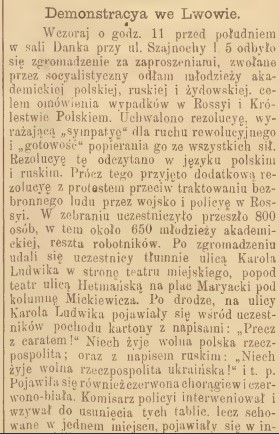
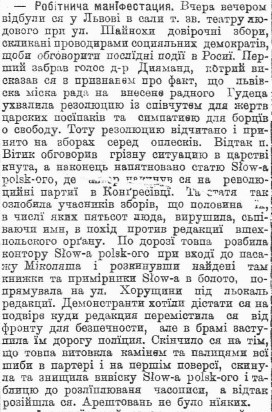
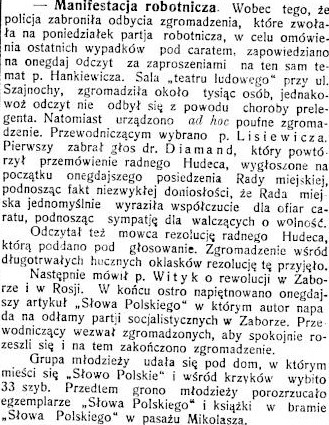
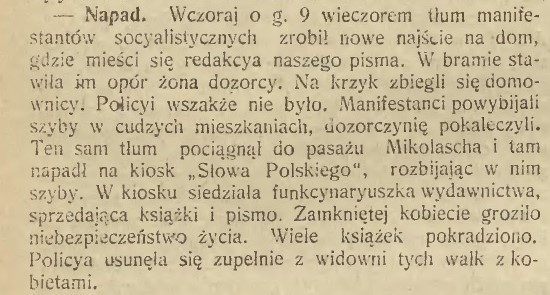
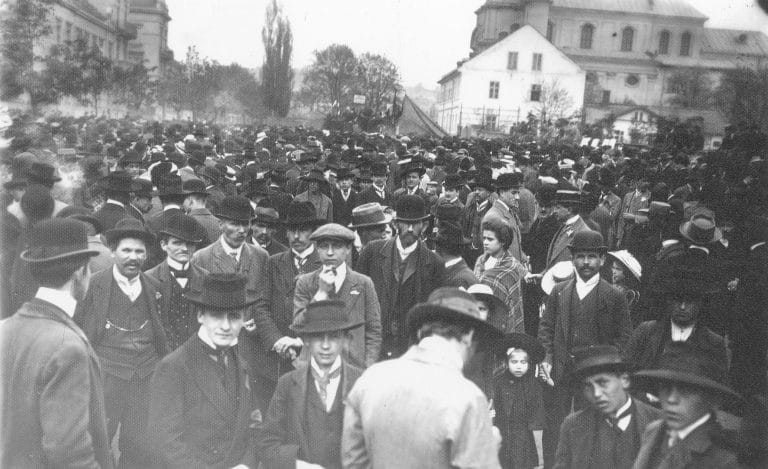
On Monday, January 31, 1905, the Polish Social Democratic Party of Galicia and Silesia (PPSD) initiated a meeting at the People’s Theater on Shainokha Street in Lviv to discuss the revolutionary situation in Russia. Four Lviv newspapers (Gazeta Lwowska, Dilo, Kurjer Lwowski, Słowo Polskie) covered this event differently, depending on their ideological positions, political agenda, and target audiences. These publications reflect the ideological palette of the leading newspapers of the then Galicia about one historical event. This source allows us to analyze the algorithms of the design and functioning of information policies and the impact of the press.